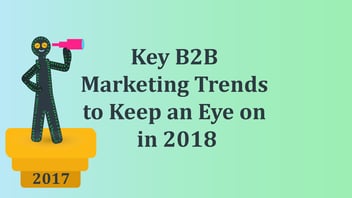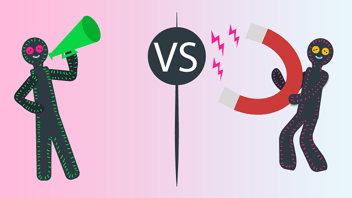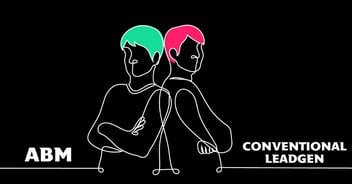
The Ultimate B2B Marketing Glossary
When you're working in B2B tech marketing agency, it can feel like you're drowning in a sea of TLAs (three-letter abbreviations) and technical B2B marketing terms.
Don't worry though, we've built you a life raft; it includes the obvious stuff too that you were too afraid to ask for. Did we miss any?
Marketing Terms
A/B Testing
A/B testing is a method of comparing two different versions of a webpage, email, or advertisement to determine which one performs better based on a predefined metric, such as click-through rate or conversion rate.
ABM
Account Based Marketing! It's when sales, marketing and customer success teams work together to define the specific companies and personas in your ICP (more on that one later) with the most potential to become your client. It ensures your efforts are super targeted and you’re spending your marketing dollars on luring in the folks with the highest potential to become your clients.
AI Tools
AI tools are software applications that use artificial intelligence algorithms to automate and improve various tasks, ranging from data analysis and prediction to natural language processing and image recognition. These tools help businesses and individuals save time and resources while achieving better accuracy and efficiency in their work.
API
API, or Application Programming Interface, is a set of protocols, routines, and tools used by software programs to communicate with each other and exchange data, enabling different applications to work together seamlessly.
AQL
An Almost Qualified Lead is a lead that's "popping", one that's one or two points from becoming MQL
B2B
B2B (Business to Business) companies sell their products or services to other businesses, not to consumers.
B2C
B2C means Business to Consumer, because surprise surprise, they sell directly to consumers. B2C customers are consumers, and B2B customers are companies.
BoTF
BoTF means Bottom of the Funnel. It follows Top of the Funnel (TotF) and Middle of the Funnel (MotF). When something is BotF it is targeted at a user who knows your brand well and has already interacted with you. Typical BotF content pieces are case studies, tutorials, and product comparisons.
BR
BR is your website and/or email Bounce Rate. For email, it's the number of emails returned unopened; for websites, it's how many people view just one page before leaving/bouncing off.
C-Level
Anyone whose title begins with a C is C-level, like the CEO, CISO, CMO, and CTO. These are the top guns in any organization, and large purchases get signed off by at least one of them, so consider them when forming marketing personae.
CAC
Customer Acquisition Cost is the total amount you spent to acquire a new customer, usually including all your marketing and sales campaigns.
ChatGPT
ChatGPT is a large language model developed by OpenAI that uses deep learning techniques to generate human-like responses to natural language inputs. It can be used for various natural language processing tasks such as language translation, text summarization, and conversational AI.
Churn Rate
When customers cancel subscriptions or stop buying from your company, they've churned. The Churn rate is the percentage of total customers who churn, and you'll track the churn rate to calculate overall CLTV and refine your marketing to retain these clients.
CISO
Generally, the Chief Information Security Officer makes the decision about buying new tech or software to use, so if you're a B2B marketing agency, they are good people to get to know.
CMO
The Chief Marketing Officer heads a company's marketing efforts and makes purchase decisions about marketing tech, sometimes together with the CISO and CTO.
CMS
Your Content Management System is the mothership running your content marketing campaigns, helping you plan, create, manage, and publish effective content.
CPA
Cost Per Action is the amount you spend for a user to take a particular action, such as a click, view or form submit.
Cost Per Acquisition is the amount you spend to acquire a new lead or make a sale.
CPC
Cost Per Click tells you how much it costs to get one person to click on your paid ad. It's an alternative metric to CPA.
CPL
Cost Per Lead is yet another way of measuring ROI on your paid marketing by calculating how much it cost to generate each new lead.
CPM
CPM, or Cost per Thousand Impressions, is a metric used in advertising to measure the cost of displaying an ad one thousand times.
Creative Message Testing
Creative message testing is the process of evaluating different versions of a message to determine which one resonates best with the target audience. This helps to ensure that the final message is both effective and impactful in achieving the desired outcome.
CRM
Customer Relationship Management is the heart of B2B tech marketing. It's both your strategy to attract, nurture, convert leads and retain customers, and the clever tech you use to keep track of all your campaigns and funnels.
CRO
Conversion Rate Optimization involves refining all the moving parts of your website and content to increase conversion rates. For example, you want to increase the ratio of folks who visit your website and those who submit a form.
CTA
This is your Call To Action, and you need it on ads, blog posts, webpages, social media posts, etc. CTAs should be loud and clear, to tell visitors what to do next.
CTO
The Chief Technical Officer is often in charge of tech buying, sometimes with the CISO and CMO. Some companies have a new hybrid post of Chief Marketing Technology Officer (CMTO). Either way, if you want to sell MarTech, you need to understand the CTO.
CLTV
CLTV is Customer Lifetime Value, the total amount of revenue that you could (or do) enjoy from one customer. It helps you identify the most valuable type of customer, market segment and measure RoI.
CTR
This is the Click-Through Rate, meaning the number of times that someone who sees your ad actually clicks on it. It's calculated as a percentage, so:
ad clicks / ad views x100
It's super important when you're running PPC campaigns.
CSS
Cascading Style Sheets, is a language used for describing the presentation of HTML (or XML) documents on your website, including colors, layouts, fonts, and animations.
CX
CX stands for Customer Experience, meaning how your customers experience your brand before, during consideration and after purchase regardless of the channel or medium.
DKI
Dynamic Keyword Insertion is a cool Google Ads technique that lets you customize PPC ad content according to the searcher's query, in order to boost CTR.
DMP
Data Management Platform, is a technology platform that collects, stores, and analyzes large sets of data from various sources to create valuable insights for marketers, such as Salesforce DMP.
ESP
Email Service Provider, is a software platform that enables businesses to send email marketing campaigns to their subscribers and manage their email lists, such as HubSpot or MailChimp.
Funnel
The marketing funnel refers to the customer journey from awareness to purchase, and includes different stages such as awareness, consideration, and decision-making.
GA
For marketers, GA isn't Georgia, it's Google Analytics, and it's the first place you look to see what's happening with your website traffic. It allows you to monitor, who’s coming to your site, from where and when.
GDN
The Google Display Network is a network of publishers who can bid on different ads and use Google's data to improve their targeting. It is often used in awareness and retargeting campaigns.
GDPR
The full name for the EU's data privacy legislation is General Data Protection Regulation. It prevents companies from spamming folks with material they didn’t request and also provides limitations on what you can do with user data. Your website, apps, and materials must be GDPR compliant, unless you love paying tough fines.
GTM
You get a choice for this one: GTM means either Google Tag Manager, or Go To Market. Google Tag Manager is a handy way to manage tags that track traffic to and around your site, while a go to market strategy is a comprehensive marketing plan for launching a product or service.
HTML
Hypertext Markup Language, is a standard markup language used to create and structure content for the web, including text, images, videos, and links, among others.
Inbound Marketing
Inbound Marketing is a marketing strategy that focuses on attracting potential customers through content marketing, social media, and search engine optimization.
KPI
Key Performance Indicator (KPI), is a metric used to evaluate the success of a business or organization in achieving its goals and objectives, providing a clear and measurable way to track progress and make informed decisions.
LTV
LTV is another abbreviation for LifeTime Value, the same as CLTV, LCV, and CLV. It's the total revenue that you expect to receive or actually receive through one customer.
MoTF
MoTF means Middle of the Funnel. It follows Top of the Funnel (TotF) and is before Bottom of the Funnel (BotF). When something is MotF it is targeted at a user who may have heard of your brand, but is not fully engaged yet. Typical MotF content pieces are eBooks, Whitepapers and Webinars.
MQL
Marketing Qualified Leads are leads who show signs of being likely to convert into customers, so it's worth it to invest more time and energy into nurturing them. You'll use lead scoring to define a MQL. You assign points to the lead based on actions (e.g. clicks, visits, form fills) and profile (e.g. location, company size, job title). If the lead crosses a point threshold they become an MQL and get transferred to sales.
NPS
The Net Promoter Score, or NPS, is a nifty way to measure how likely someone is to recommend your business. It's used to estimate how satisfied customers are with your brand.
OOO
An Out-Of-Office reply is an automated email response, letting you know the recipient isn't available right now.
Open Rate (OR)
Tracking open rates for marketing emails and texts lets you know how many recipients thought your subject line was appealing enough to be worth reading, so if it's low you'd better get to work.
Outbound Marketing
This is a marketing strategy that involves reaching out to potential customers through traditional advertising methods such as cold calling, direct mail, and email marketing.
PEST
PEST stands for Political, Economical, Social and Technological factors. It's a tool used to measure and assess market factors that might influence a business or a product.
PPC
Pay Per Click campaigns are paid digital advertising, where you pay a fee every time someone clicks on your ad. PPC ads use CPC, CPA, or CPL to decide how much you'll pay each time.
RevOps
RevOps (Revenue Operations) is a strategic approach that aligns sales, marketing, and customer success teams with the goal of driving revenue growth and improving the customer experience.
ROI
ROI stands for Return On Investment, and it's simply the amount of revenue you receive in exchange for the money you invest in marketing. Calculating RoI can be challenging, and there are a number of ways to do it.
SaaS
Software as a Service sounds clumsy, but SaaS is sassy and cute! SaaS products are cloud-based tools and apps, and SaaS marketing knows the right tricks for this specific vertical.
SEO
Search Engine Optimization means designing a website that search engines recognize as the perfect match to specific search queries. It includes everything from page load speed to keyword usage and website structure.
SEM
Search Engine Marketing, is a digital marketing strategy that involves promoting websites by increasing their visibility in search engine results pages through paid search advertising and search engine optimization.
SERP
The Search Engine Results Page is the what displays on a search engine (be it Google, Yahoo etc.) after a user submits a search query. On Google there are 10 results alongside ads and other content (such as images, knowledge cards etc.).
SLA
A Service Level Agreement between two (or more) organizations, teams or people helps align goals, timelines for service provision, set outcomes, and clarify responsibilities.
SMB
Small and Medium Business is long and hard to say, but SMB just rolls off the tongue.
SMM
Social Media Marketing, is a digital marketing strategy that involves creating and sharing content on social media platforms to engage with audiences and promote brands, products, or services.
SQL
These are Sales Qualified Leads. When MQLs get passed to the sales team and they deem them to be a legitimate lead, worth following up with, the lead becomes an SQL.
SRC (source)
In the HTML code that's the backbone of most websites, <src> is the origin code for material. For example in the code for an image on your site it would read <img src=”. You would then put the origin of the image, the image URL next.
SWOT
Analysing SWOT, namely your Strengths, Weaknesses, Opportunities, and Threats, is a good idea for everyone. In B2B marketing, SWOT analysis helps you decide marketing strategy.
Thought Leadership
A marketing strategy that involves establishing yourself or your company as a leading authority in your industry through the creation and promotion of high-quality content, such as whitepapers, case studies, and blog posts.
ToTF
ToTF means Top of the Funnel. It preceeds Middle of the Funnel (MotF) and Bottom of the Funnel (BotF). When something is TotF it is targeted at a user who hasn't encountered your brand before. Typical TotF content pieces are blogs and infographics.
UI
UI is the User Interface for your product, and it's often lumped together with UX. UI is all about the product's visual design and appearance, and that affects UX.
User Persona
This refers to a fictional representation of a business's ideal customer, based on demographic, behavioral, and psychographic data.
UX
UX means User Experience, and it covers every way that people interact with your product, including onboarding, troubleshooting, using it as part of their workflows, etc.
XML Sitemap
Every website needs an XML sitemap to tell search engine robots where to find different pages. A good XML sitemap gives your SEO a boost.
7Ps
The 7Ps of marketing are
- Product
- Place
- Price
- Promotion
- Physical evidence
- People
- Processes
They were first coined by Jerome McCarthy and added to by Booms and Bitner. They're a foundation on which most modern marketing is built. Learn more about them here.
UTM
“UTM” is short for “Urchin tracking module.” Urchin Software paved the way for what we call Google Analytics. A UTM code is an addendum to a URL that tells Google Analytics and other tools some information about the link, for example where the user came from.
Find the right words for all your B2B marketing
This list isn't exhaustive, and hopefully it's not exhausting either! We've covered the main B2B marketing terms, but there are definitely more out there. What do you think we should add?
If you're looking for a knowledgeable B2B marketing agency that can ace any B2B marketing test, we're here for more tech marketing advice.







